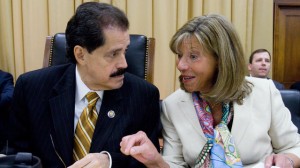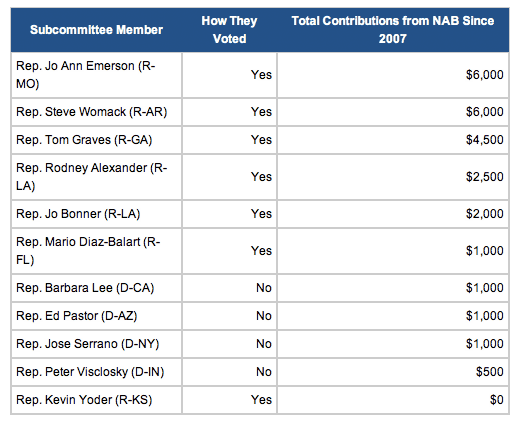From the Department of No Good Deed Goes Unpunished comes news of yet another attempt to block that new FCC transparency rule requiring television stations to post online the identity of political ad buyers — and the vast amounts of money they’re spending.
Republicans on the House Appropriations Financial Services subcommittee passed a rider Wednesday that would block the rule by stripping its funding. According to the congressional newspaper The Hill, “Democrats accused Republicans… of acting to keep the names and spending of outside ‘fat cats’ secret in an attempt to hide their influence on elections.”
“’It is obvious what this is all about and it is embarrassing, frankly,’ said Rep. Norm Dicks (D-Wash.), the ranking member of the Appropriations Committee. ‘It looks like you are trying to cover up the fact that these fat cats are coming into these elections and they don’t want their names known.’”

Rep. Jose Serrano, D-N.Y., and Rep. Jo Ann Emerson, R-Mo., confer on Capitol Hill in 2010. (AP Photo/Harry Hamburg)
The provision, part of the draft budget, was submitted by subcommittee chair Jo Ann Emerson, Republican of Missouri, who confronted FCC Chairman Julius Genachowski on the new transparency plan at a hearing in March. “Why do you care about this?” she demanded. “You have more important things to worry about. Why in the world is this a big priority?”
Genachowski explained that while the information could be seen on paper in public files at local stations, the move to digital is an important priority because it makes the data more easily accessible to all.
Wednesday’s vote came the day after the Wisconsin recall vote in which millions were spent on TV ads for and against Republican Governor Scott Walker (mostly on his behalf) and two weeks after the National Association of Broadcasters (NAB) filed suit with the Federal Court of Appeals in the District of Columbia to vacate the FCC rule, arguing that it’s “arbitrary, capricious, and in excess of the Commission’s statutory authority, inconsistent with the First Amendment and otherwise not in accordance with law.”
While the Sunlight Foundation reported that “a broadcasting industry source denied” that the NAB had “pushed” for the House vote against the FCC, the nonpartisan watchdog did note that the broadcasters’ trade group “has given over $9 million to Republicans and Democrats over the years since 1989, making them the 118th biggest giver in that period.”
“Emerson, one of the highest ranking members on the Appropriations panel, is one of the bigger House recipients of this campaign cash this election cycle, at $3,500… In her career, she’s received $7,500 from NAB’s PAC, according to Influence Explorer.”
Other members of the appropriations panel have received campaign donation from the NAB, including Democrats. Open Secrets published this table showing how much money each member received since 2007, and how they voted.
In response to the House subcommittee vote, the media reform group Free Press urged the public to participate in a letter-writing campaign to members of Congress. According to its senior policy counsel Corie Wright, “Some members of Congress, working at the behest of the broadcast industry, want to keep the public in the dark. The FCC’s online political file rules will shine a brighter light on the political ads that have inundated local airwaves this year.”
“Broadcasters spent nearly $14 million on lobbyists in 2011. Now they’re spending millions more on campaign contributions to buy support from some members of Congress — but that’s a drop in the bucket compared to over $3 billion in political ad revenues that television stations stand to pull in this election cycle.”
According to other industry sources, that $3 billion figure may be a gross underestimate. Kip Cassino, vice president at the media research firm Borrell Associates tells Medill Reports at Northwestern University, “Every media channel and media outlet, from local stations to the networks, is licking their lips over this feast of spending.”
“Cassino estimates broadcast spending could reach $5.64 billion and cable spending could reach $938 million, which includes 48 percent coming from PAC’s, super PAC’s and national political party committees.
“’There’s a staggering amount of money out there. This is new territory. It’s never been this big before,’ said Cassino.”
The Center for Responsive Politics’ Open Secrets website reports that the subcommittee’s attempt at blocking the FCC’s directive to make political ad data available to anyone with access to a computer “has an uphill slog before it could become law…”
“It must pass through the Republican-controlled Appropriations Committee and the full House before making its way to the Democratic-controlled Senate. The Appropriations Committee is expected to take up the bill within the next few weeks.”
Tim Karr, senior director of strategy at Free Press, told us he thinks the Democratic Senate probably won’t let the House provision make it to law, “but one can’t underestimate the powers of the media lobby.”
Take Action
There are several obstacles in the way of the FCC rule becoming law, but you can help make it happen. Here are some campaigns aimed at getting political ad data online.
Send a letter to your congressperson asking him or her to support media transparency in the age of Super PACs and massive ad spending.
Sign a petition asking the Office of Management and Budget to expedite and approve the new FCC rule requiring broadcasters to post their political ad data online. The public comment period ends on June 11, 2012.


